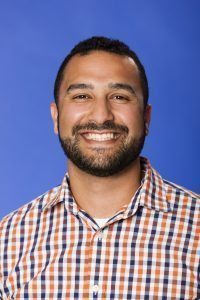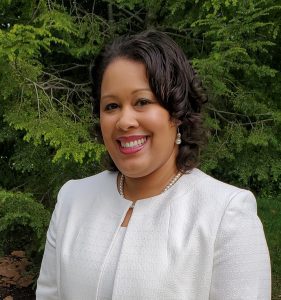
5 Questions with Brandan Jason, Automation Sales Executive, Mid-Atlantic, Opentrons
“5 Questions With…” is a weekly BioBuzz series where we reach out to interesting people in the BioHealth Capital Region to share a little about themselves, their work, and maybe something completely unrelated. This week we welcome 5 Questions with Brandan Jason, Automation Sales Executive, Mid-Atlantic, Opentrons.
Brandan Jason is a current resident of Gaithersburg, MD, and has lived in Montgomery County for the past five years. He grew up in upstate New York and attended St. John Fisher College. Brandan loves to network and make new connections. He is passionate about helping others and giving back to the community by volunteering with groups like The Miracle League and Roc Solid Foundation. Outside of work, he also enjoys spending time with family, playing golf, and visiting craft breweries.
1. Please introduce yourself to our audience with a look back at your education, training, and career.
I hold a Bachelor of Science and began my professional career working in sales and marking as an affiliate of Penn State University. Following, I relocated to Maryland and began to shift my career towards the life sciences industry. As a technical recruiter, I learned about the vast opportunities that the BioHealth Capital Region offers in the science, health, and biotech space. From here, I went on to work for Thermo Fisher Scientific.
I worked with Thermo Fisher for a little over three years. During that time, I first served as the Global Inside Sales Representative for Fisher Clinical Services, BioServces. After some success, I transitioned into an outside sales role as an Account Manager with Thermo Fisher’s Laboratory Products, covering parts of Maryland and Virginia. In this position, I was responsible for the lab consumables and essentials portfolio, made up of liquid handling and benchtop instruments, pipettes and tips, tubes, storage plates, and other labware. During this time, I developed a passion for liquid handling. Recently, I joined Opentrons as an Automation Sales Executive for the Mid-Atlantic region to help scientists take a more automated approach to their work.
2. Talk about your role at Opentrons Labworks Inc., and what exactly does Opentrons do?
My role at Opentrons as an Automation Sales Executive is awesome! I have the opportunity to work with a variety of labs and researchers along the east coast. It is exciting to learn about the work that they are doing to solve some of the complex issues that society faces and help make our world a better place to live. A key component of my job is understanding their workflows and how our team at Opentrons can assist them with an appropriate, automated solution.
I am part of the Robotics division within Opentrons. We offer an automated liquid handling system that is open-source, flexible, and affordable. Essentially, a pipetting robot that adapts to various lab workflows such as sample prep, normalization, serial dilutions, nucleic acid extraction, qPCR setup, and NGS library prep. In addition, I consult with labs to help them convert manual pipetting into an automated process by using our platform. The team at Opentrons consists of a mix of professionals from across the industry, which results in diverse perspectives and collaborative solutions.
3. What are some of the biggest challenges you’re hearing from your customers, and how is Opentrons addressing those?
One of the biggest challenges that we are hearing from customers is that they do not have enough time or resources to perform tedious liquid handling steps by hand. Performing several liquid transfers can be very time-consuming, plus it is extremely strenuous on the user. We believe that scientists should be able to spend their time designing experiments and analyzing data while helping to reduce fatigue.
Another major challenge can be accessibility. Some labs are faced with limited budgets, and most lab automation instruments are very costly and difficult to use. We believe that lab automation should be affordable, simple, and open to customization. Therefore, we take a customer-first approach, with lower costs and a user-friendly model, which allows more people access to this technology.
4. What do you see as the future of “Robots for Biologists”? Give us what you’d like to see the scientific community using them for in the next 5-10 years?
I foresee a future where there is a stronger co-functioning between humans and robots within science, creating more reliable and reproducible results. Furthermore, I believe that this will lead to faster scientific discovery, less expensive experimentation (over time), and improved knowledge and data. Of course, the human scientist will never be replaceable, for very good reason, but automation will allow them to focus more on what really matters. Our goal at Opentrons is to automate experiments that were previously done by hand so that the scientific community can spend more time pursuing answers to some of the world’s most important questions.
I would personally like to see the scientific community using robots to further explore and develop cures for rare disorders and diseases. Although science has made large strides over the years, there are still a number of rare diseases that we do not know much about. I recently lost my uncle to a rare disease, and I hope that someday, families will not have to worry as much when their loved one is diagnosed. I am confident that with the use of automation, scientists will be able to cure more diseases at a faster pace and make the world healthier.
5. If there qas an Olympics for everyday activities, what activity would you have a good chance at winning a medal in and why?
Washing the dishes… I could definitely make it on the podium. Ironically enough, my daily job is supporting labs with automating their liquid handling processes, yet I wash my dirty dishes by hand! Regardless, I am confident that I could win a medal in this everyday activity for a couple of reasons. One, not a lot of people still practice this age-old chore. Two, I have the process down to a science (pun intended) and am rather efficient. However, I will admit, I should probably take a page out of my own book and use the dishwasher more often. Everyone should use one these days, right?! Shameless plug: I suppose that is similar to my thoughts regarding research and lab automation!
Thank you to Brandan Jason, Automation Sales Executive, Mid-Atlantic, Opentrons for participating in the 5 Questions with BioBuzz series, and stay tuned for more interviews with others from across the BioHealth Capital Region and beyond.




